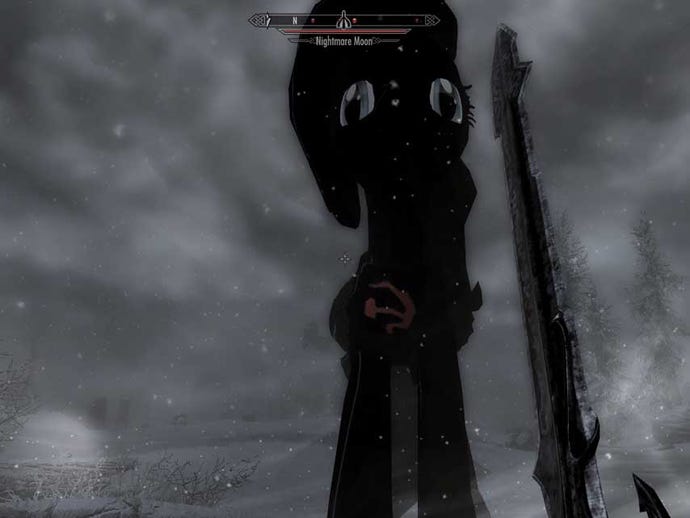Modders are developers and should have the chance to earn rewards, says Bethesda
Bethesda Game Studios has released a lengthy statement explaining why it elected to trial paid mods for Skyrim, and explaining the revenue split.
Bethesda has said paid mods are still in their infancy, and that it is listening to feedback and will make changes if necessary.
"We believe mod developers are just that: developers. We love that Valve has given new choice to the community in how they reward them, and want to pass that choice along to our players," the studio said in a statement published on the Bethesda blog (note for visitors from the future: click the link again after passing through the age gate and language selection screens, if the post has vanished off the front page).
"We believe most mods should be free. But we also believe our community wants to reward the very best creators, and that they deserve to be rewarded.
"There are certainly other ways of supporting modders, through donations and other options. We are in favor of all of them. One doesn’t replace another, and we want the choice to be the community’s. Yet, in just one day, a popular mod developer made more on the Skyrim paid workshop than he made in all the years he asked for donations."
How much are modders earning?
Bethesda outlined the revenue split delivered by the paid modding system. Valve takes 30%, as it does on every transaction on Steam. Bethesda takes 45%, and the modder gets 25%. this percentage was determined by Bethesda, not Valve, at its discretion.
"Is this the right split? There are valid arguments for it being more, less, or the same. It is the current industry standard, having been successful in both paid and free games. After much consultation and research with Valve, we decided it’s the best place to start," Bethesda said.
"This is not some money grabbing scheme by us. Even this weekend, when Skyrim was free for all, mod sales represented less than 1% of our Steam revenue.
"The percentage conversation is about assigning value in a business relationship. How do we value an open IP license? The active player base and built in audience? The extra years making the game open and developing tools? The original game that gets modded?
"Even now, at 25% and early sales data, we’re looking at some modders making more money than the studio members whose content is being edited."
Bethesda pointed out that open IP licenses, which give creators access to IP but not development tools, typically offer just 15-20% revenue share.
"The 25% cut has been operating on Steam successfully for years, and it’s currently our best data point. More games are coming to Paid Mods on Steam soon, and many will be at 25%, and many won’t. We’ll figure out over time what feels right for us and our community. If it needs to change, we’ll change it."
So why is this happening?
Elsewhere in the post. Bethesda outlined its long history and great love for modding, but said the mod scene isn't as lively as it could be.
"It’s still too small in our eyes. Only 8% of the Skyrim audience has ever used a mod. Less than 1% has ever made one," the developer said.
Back in 2012, Valve showed Bethesda data about the effects of paid user content in games like Team Fortress 2.
"All of it hugely positive. They showed, quite clearly, that allowing content creators to make money increased the quality and choice that players had," Bethesda said.
The studio agreed to give it a go on one condition: the Workshop could not be curated. Everyone had to have the chance to have a go, and Bethesda would not play favourites. Valve finally made that possible this month, and here we are.
Bethesda noted that pricing issues are amusingly similar to its own experiments, ala the infamous Horse Armour, and should settle down over time. It said it doesn't feel that it is its place to dictate pricing to modders.
It also reiterated that modding is development, so will face similar problems offering support and preventing theft. Bethesda is confident Valve will provide solution for these issues and any others that arise. If necessary, it will support a curated Workshop, but is reluctant to do so.
Bethesda concluded its post with a discussion on the potential impact of paid mods on the modding community. It said it is staunchly opposed to a future where mods are only available via a DRM-controlled platform. As evidence of this, it pointed out that it shipped Oblivion and all Skyrim DLC free of DRM.
"Our belief still stands that our community knows best, and they will decide how modding should work. We think it’s important to offer choice where there hasn’t been before," it said.
"We will do whatever we need to do to keep our community and our games as healthy as possible. We hope you will do the same."




